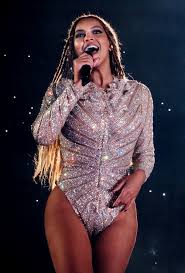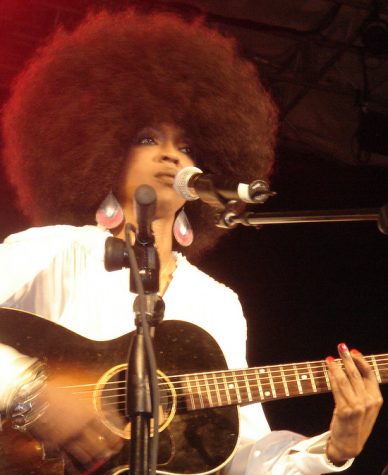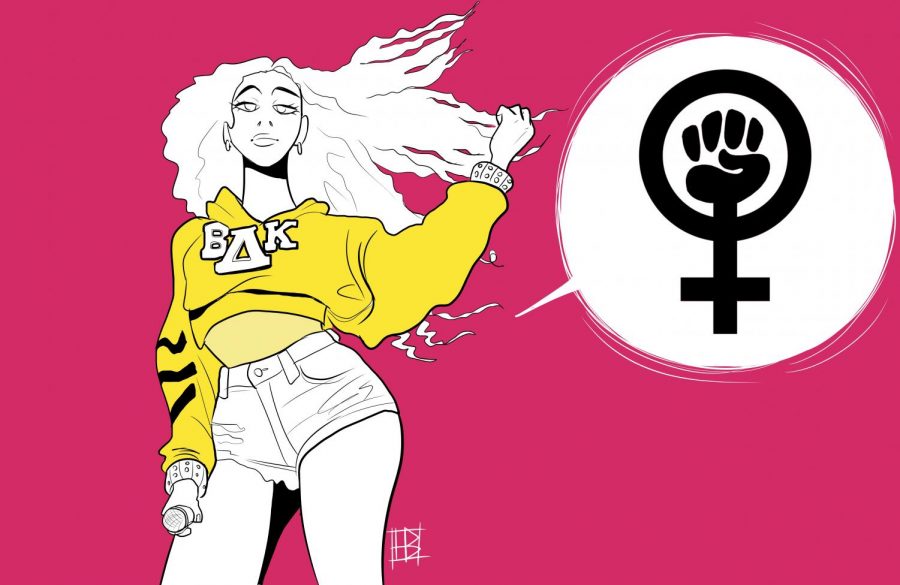Hip-Hop Needs More Empowering Female Voices
Words that once were used in hip-hop to degrade and objectify women to skewed, sexualized versions of what we truly are had the power stripped from them when women used them too.
Mar 28, 2019
Female voices in hip-hop are beyond important. In a genre that historically was and still is dominated in number by men, a woman’s perspective is empowering, refreshing and we need more of it.
Hip-hop is so rich with history and oozing with vital force, so it’s disappointing to see how often women are demeaned and objectified as sexual objects in the most popular and successful songs within the genre.
From early rappers like Dr. Dre with his song “B*tches ain’t Sh*t but H*es and Tricks” to modern rappers like Lil’ Wayne with his song “Alphabet B*tches” — once the degradation started, it never stopped. Not only is it blatantly disrespectful to half the population, but it is also disrespectful to the music itself — women have played a large role in the rise of hip-hop in the mainstream.

Beyonce has made a continual impact on hip-hop through female empowerment across the span of her entire career. She started out in the group “Destiny’s Child” before starting her wildly successful solo career.
At the 2019 Grammys, rapper and musician Cardi B won best rap album of the year for her album “Invasion of Privacy.” It was a huge feat for her career and also for the history of the rap genre — it was the first time a solo female rapper won this award.
The best rap album category has existed for over two decades and it was only until this year a woman prevailed — while other female rappers like Missy Elliot and Eve were nominated in the past, not one of those women ever came out on top.
A moment like this is monumental because it proves that modern female musicians in hip-hop can achieve equal success despite competing against male musicians. The depth and soul women bring to hip-hop is invaluable and although their voices are powerful — they are lacking in number. It is a phenomenon that can be explained by various factors.
In the late 90s, the number of women in hip-hop signed to major record labels was surging — the Grammys saw this and created a new category called Best Female Rap Solo Performance in 2003. But it was quickly dumped two years later because of the decline of women musicians in hip-hop.
This did nothing but deepen the disparity in number between men and women in the industry and lowered the chances of the remaining women to be recognized in the mainstream.
In NPR’s article “Where Did All the Female Rappers Go?” rapper MC Lyte says, “This is pretty much what it was like when women weren’t able to get major recording and release opportunities,” when talking about the decline. This is a startling realization and should spark a sense of urgency — what happens to hip-hop without women in the mainstream?
Women in the genre have consistently promoted female empowerment in all its many forms — body positivity, sexuality, love and sisterhood. Without their voice, some of the more misogynistic and demeaning lyrics could become detrimentally normalized. Rappers like MC Lyte and Queen Latifah put women on the board with progressive lyrics that highlight the trials and tribulations of being a woman at this time — especially a woman of color.

Lauryn Hill is a hip-hop icon and has influenced the genre beyond measure. She started out in the rap group “The Fugees” before she made two solo albums.
Queen Latifah highlights this in her song U.N.I.T.Y “Every time I hear a brother call a girl a b*tch or a h*e/ Trying to make a sister feel low/ You know all of that gots to go.” Queen Latifah and many other pioneers’ voices cut through what hip-hop was used to hearing — they brought a fresh sound and more importantly a whole new perspective to the genre.
And women haven’t stopped bringing girl power to hip-hop.
Musicians like Beyonce consistently uses her massive platform to endorse feminism and write hit songs about feminine power. Her 2016 album “Lemonade” took the world by storm and quickly became an anthem for women across the globe. These reaffirming attitudes of mainstream musicians are important because the message they send has a significant impact on their audiences.
According to Psychological Science.org, positive affirmations are psychologically proven to lower stress, anxiety and even defensiveness in response to threats on our sense of self.
When audiences listen to music that sends a positive message about women both parties are affected. It can change the way women think about themselves and how the world views them. Simultaneously, it can expose men to a different narrative to how women are talked about in hip-hop.
Although I do allude to most of the misogynistic songs and lyrics being performed by male rappers, that is not always the case. Sometimes men rap respectful rhymes about women.
In Tupac Shakur’s song “Keep Ya Head Up” he raps about women in the form of a call to action, “And since we all came from a woman/ Got our name from a woman and our game from a woman/ I wonder why we take from our women/ Why we rape our women, do we hate our women?/ I think it’s time to kill for our women/ Time to heal our women, be real to our women.”
The thing is, old or new hip-hop, women are more often than not referred to by demeaning words and demeaning words only.
However, I know women in hip-hop sometimes refer to other women and even themselves with these same demeaning lyrics. The difference is that when women use these words they are harnessing the power and negativity that the original intention of the word had — and making it their own.
Words that once were used in hip-hop to degrade and objectify women to skewed, sexualized versions of what we truly are had the power stripped from them when women used them too.
Women in the industry face many obstacles that make the climb to the top all the steeper. While being a woman in the rap game takes exceptional amounts of talent to gain recognition, unfortunately, the appearance and appeal of these women play a large role in their success.
The NPR article states, “We might read these artists’ use of explicit sexuality as pure business savvy, or even their willingness to confront American taboos against female, and specifically black female, sexual expression. But it also dovetails nicely with the crude exploitation of women that, as Professor Tricia Rose argues, has become ‘almost required’ in mainstream hip-hop.”
This is why sisterhood is so important in hip-hop.
When girls support girls they can raise themselves up and help each other through an industry that equates their looks and their talent in importance, an industry in which they are outnumbered, an industry that makes the female musicians swim against the mainstream to get recognized.
In number, women musicians in hip-hop can empower each other and their audiences. In number, these voices can turn from a whisper to a shout — a call to action that can reach the whole world.
In the words of Ms. Lauryn Hill, “Music is supposed to inspire/ How come we ain’t gettin no higher?”









Connor Bradley ◊ Apr 12, 2019 at 8:34 am
We already have an adequate representative for female hip-hop! Her name’s CARDI B
HAHAHAHAHAHAHAHAHAHAHAHAHAHAH
Beck Rinks ◊ Apr 11, 2019 at 10:31 pm
Someone is too afraid to put their last name…
Duke ◊ Apr 11, 2019 at 1:04 pm
its thursday
Connor ◊ Apr 11, 2019 at 9:15 am
Reading these comments is more fun than reading the article haha..
Max Wiggins ◊ Apr 10, 2019 at 1:25 pm
darius should replace 6ix9ine
Sebastian ◊ Apr 9, 2019 at 5:52 pm
I don’t listen to hip hop, but I do know money talks in any industry. If a change is going to come, it will be from the top. The big publishers would have to decide they want to push a new agenda, one that welcomes women. The question is, why would they choose to do that?
Victor ◊ Apr 9, 2019 at 11:11 am
There’s a ton of female representation in hip hop you just need to know where to look. Little Simz, Janelle monae, Jean grae , etc
Sean Dallas-Orr ◊ Apr 9, 2019 at 10:37 am
I only got on here to say that Sydney is right. We are the average consumers of this genre of music and there should be no sort of “movements” towards equal representation. Music is music and if a female doesn’t make top charts its not because she is a female, its probably because nobody likes her music. I feel that everyone is forgetting that all we do is listen to music, and I’m sorry but if it doesn’t sound good then I’m not going to listen to it. Just because someone maybe prefers the sound of a males voice doesn’t make them a misogynist, music is subjective. So I don’t think there should be equal representation, representation needs to be made through these people making the same quality of music as the others, not because they’re female.
Sydney Ballard ◊ Apr 8, 2019 at 11:41 am
much as we want to equate this issue to a boy joining Girl Scouts and vice-versa, social issues aren’t that simple. We need to appreciate hip hop for the political conversation it can create. It’s not worth our time to debate whether we need a 50/50 representation of men and women in the genre. The good music should and will earn it’s spot rightfully, regardless of whether the artist has a male or female genitalia.
Sydney Ballard ◊ Apr 8, 2019 at 11:38 am
How about we let male and female hip hop artists do their things and the best shall win. Men and women in hip hop have both sexualized and demeaned the opposite sex, so the issue goes both ways: Cardi B has drugged and robbed unconscious men while Biggie was the OG perpetrator of violence and sexualization of women with “Big Booty H***.” The genre of rap/hip-hop itself was founded upon drawing attention to controversial topics that were untouched by the mainstream media in order to create a sense of unity and acknowledgement of underserved and violence-ridden communities. Is violence good? No. Should sexualization be frowned upon? Yes. But we can’t ignore the fact that these things are real and affect many people. Music is often the most accessible outlet for frustrated communities that may not yield the movielike small town underdog who goes onto an Ivy League and returns with the quick fix for race/poverty-induced crises. North Carolina’s J. Cole is a prime example of using rap to draw attention to social issues like black stereotypes and religious persecution. As
Christan Rocha ◊ Apr 8, 2019 at 9:54 am
They are correct there should be however people need to like your music. You cant get mad that there arent a lot of famous female hip hop artist. If people are good then people will listen to them you should not be a famous artist or call people that don’t like your music sexist just because you are a female.
Georgena ◊ Apr 8, 2019 at 7:41 am
Zach,
I just searched it up, and I’m pretty sure that Girl Scouts does allow boys now (I think in response to boy scouts now allowing girls, but I’m not too sure about that). I think there is some ridiculousness in some people stating that girls need to be ‘protected’ from men, and as dance teams have supervisors, it’s not crazy to encourage boys to participate in traditionally female-dominated things!
I think high school demographics are more trained on female inclusion in things, rather than inclusion of both genders. But again, I’m not too educated; I just wanted to contribute/agree! 🙂
(That isn’t to say that I don’t think we need more positive female artists in rap, but that’s totally separate from the article)
You should submit a piece for the Sage if you’re passionate enough to convince other people! ( https://thesagenews.com/submit-a-letter/ )
Zach Stansell ◊ Apr 7, 2019 at 4:02 pm
Jasmine,
You have to admit the sexism in that comment. I feel like girls scouts specifically is kids so it isn’t “men and women”, and girls are allowed in boy scouts so why not vice versa? Dance teams should also be all-inclusive in my opinion. Sound crazy? Because it is. We should have everyone allowed in anything or everyone should be regulated the same.
I agree with Darius btw.
Darius Rahmanian ◊ Apr 4, 2019 at 3:47 pm
Lmaoing at this comment thread. Representation doesn’t mean they will be good at it. There are thousands of burgeoning hip hop artists all over the united states and alot of them are male. Simply saying that women should just get free gimmes just because they are under-represented is the exact opposite of the “equality of the sexes.” They should have to equally compete with everyone else and if they aren’t as good then their product should not be sold in the market.
It’s not like women in hip hop are shining queens who spill the tea, not only that they are the exact opposite of role models they indulge in being as stereotypical as possible, look at Cardi B who literally drugged and stole from men but faces no ramifications. They don’t uphold any sort of social value as they constantly perpetuate cheating and abusive relationships and teach in their songs to be wholly materialistic, creating a cycle paralleled to that of male artists perpetuating violence and materialism.
Male or female it doesnt really matter because hip hop as a genre capitalizes on nominalism and the degredation of western values.
Jasmine Harper ◊ Apr 3, 2019 at 5:46 pm
I agree with Zach, but dance teams and girl scouts are different because girls need more privacy than men. Men should not always be around women to make sure that women are safe.
Jack denver ◊ Apr 3, 2019 at 5:43 pm
Alright and while you are at it having female empowerment for hip hop, I will be empowering men to join girl scouts and join the female dance teams 🙂 Since those are dominantly female. Or do males not deserve equal representation?
Zach Stansell ◊ Mar 29, 2019 at 4:55 pm
I am hoping for a response from commenters and I’m happy to debate with people as long as they aren’t stubborn.
Women have an equal, if not higher, representation in Hip-Hop and music in general compared to men. Also, saying Hip-Hop “needs” more women sounds really angsty and needy.
I don’t have the time to write a long speech right now, but yeah.
CHANGE MY MIND, Steven Crowder style.
Eli ◊ Mar 29, 2019 at 1:23 pm
AgRee 10o%%
Joy ◊ Mar 29, 2019 at 11:05 am
Such an uplifting & empowering article. The sage needs to do more pieces like this!
ethan ◊ Mar 28, 2019 at 6:59 pm
ok